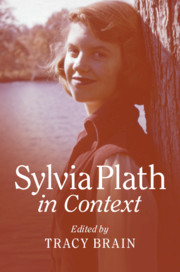Book contents
- Sylvia Plath in Context
- Sylvia Plath in Context
- Copyright page
- Contents
- Notes on Contributors
- Acknowledgements
- Chronology
- Abbreviations and Textual Note
- Key Archives
- Introduction
- Part I Literary Contexts
- Part II Literary Technique and Influence
- Part III Cultural Contexts
- Part IV Sexual and Gender Contexts
- Part V Political and Religious Contexts
- Part VI Biographical Contexts
- Part VII Plath and Place
- Part VIII The Creative Afterlife
- Chapter 31 An Alternative Afterlife: Plath’s Experimental Poetics
- Chapter 32 British and American Editions of Ariel and The Bell Jar
- Chapter 33 After Plath: The Legacy of Influence
- Chapter 34 P(l)athography: Plath and Her Biographers
- Bibliography
- Index
Chapter 33 - After Plath: The Legacy of Influence
from Part VIII - The Creative Afterlife
Published online by Cambridge University Press: 03 August 2019
- Sylvia Plath in Context
- Sylvia Plath in Context
- Copyright page
- Contents
- Notes on Contributors
- Acknowledgements
- Chronology
- Abbreviations and Textual Note
- Key Archives
- Introduction
- Part I Literary Contexts
- Part II Literary Technique and Influence
- Part III Cultural Contexts
- Part IV Sexual and Gender Contexts
- Part V Political and Religious Contexts
- Part VI Biographical Contexts
- Part VII Plath and Place
- Part VIII The Creative Afterlife
- Chapter 31 An Alternative Afterlife: Plath’s Experimental Poetics
- Chapter 32 British and American Editions of Ariel and The Bell Jar
- Chapter 33 After Plath: The Legacy of Influence
- Chapter 34 P(l)athography: Plath and Her Biographers
- Bibliography
- Index
Summary
Fiona Sampson looks beyond any simplistic account of legacy in her nuanced tracing of Plath’s continuing influence on British poetry. While Plath left no substantial or explicit articulation of her poetics, her early published work indicates some of her own literary debts. The free verse which eventually muscles its way out of that initial formality is closely related, in both rhythm and register, to exactly contemporary work by Ted Hughes. Almost universally read by contemporary British poets, she contributes a Plathian dimension to contemporary British poetics as a whole. This is less apparent in today’s Confessional free verse, which owes much to life writing and oral forms, than in the continuation, alongside the Hardy/Larkin mainstream, of a more risk-taking, symbolic and higher-register tradition. Its protagonists include Sharon Olds, Louise Glück, Selima Hill and Denise Riley.
Keywords
- Type
- Chapter
- Information
- Sylvia Plath in Context , pp. 350 - 359Publisher: Cambridge University PressPrint publication year: 2019

